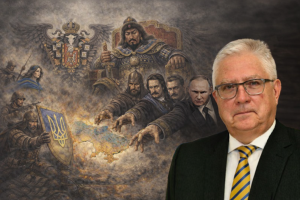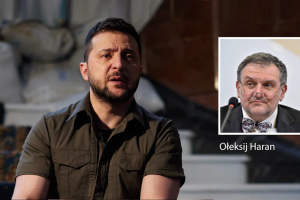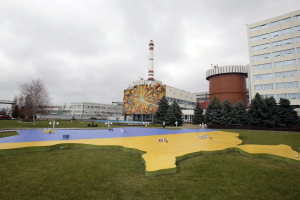
Head of Regional Security and Conflict Studies at the Ilko Kucheriv Democratic Initiatives Foundation, Research Fellow at the London School of Economics and Political Science
Special for European Pravda
'Key Clusters for the Implementation of the Minsk Agreements' is the name of a new document that the Normandy Four is developing on the proposal of Germany and France.
As is (regrettably) usually the case in negotiations on Donbas, society learned about the negotiations on this subject from the Russian Federation. While Ukraine traditionally keeps silent or limits itself to general comments on the course of the Normandy Format meetings, the Russians are conducting an information campaign ahead of Kyiv. Following the usual tactics, the proposal text was published in the Russian press, presented, of course, as interpreted by the MFA of Russia.
And the head of Ukrainian President's Office Andriy Yermak in a comment about this leak, though indirectly, but admitted the authenticity of the Ukrainian proposal.
So what is the new plan? What is this—a hope for progress or another dead end? Are there any hidden dangers in the proposals of Paris and Berlin?
And the 'favourite' question of Ukrainians: is there any 'zrada' [betrayal of Ukrainian interests] in the proposals from Zelensky's office?
Anatomy of 'clusters'
The idea to develop the so-called 'clusters' really comes from Ukraine's partner states in the Normandy Format, i.e. Germany and France.
In essence, this is yet another attempt to develop an implementation sequence of the Minsk Agreements points, to clarify the question of what and following what should be realized. Because it is the order that causes the most controversy. In particular, Ukraine insists that the 'political' points cannot begin to be implemented until the 'security' ones are met.
Hence the proposal to divide 'Minsk' into several clusters, and only after the completion of the first cluster to move on to the second and so on, alternating political, economic points and the such. This is not a fundamentally new idea. The so-called 'Steinmeier formula' was based on exactly the same principle in its time.
This time, however, Berlin and Paris did not offer new formulas or new ideas. Their proposal is more of a diplomatic 'paraphrase', or even a 'copy-paste' of the Minsk agreements. But their proposed order is noteworthy.
The main positive aspect is the principle of 'safety first'.
First, security measures, a prisoner exchange, and the unimpeded work of the International Committee of the Red Cross and the OSCE SMM on the territory of ORDLO. Everything else—only under these conditions.
It is also proposed to adopt a roadmap for the implementation of the Minsk Protocol at the level of the Normandy Four leaders, that is, signed by Putin (Russian Federation, as we know, tries to avoid taking responsibility for such documents).
According to the Franco-German proposal, local elections should begin only after the completion of the foreign contingent's withdrawal and disarmament under the supervision of the OSCE SMM.
But there are also less beneficial things for Ukraine that are already stipulated by 'Minsk'.
In particular, the parallel adoption of constitutional reform in terms of decentralization 'taking into account the peculiarities of ORDLO' (Bankova has repeatedly denied the intention to change the Constitution) and all the laws provided for in the Minsk agreements. However, according to Berlin and Paris, they should come into force gradually, and this will depend on the course of the disarmament of militants and the withdrawal of foreign troops.
Another issue is the border.
At the time of the local elections, full control of Ukraine abroad is not envisaged, although in return there should be an 'expanded international presence' on the part of the OSCE SMM with a broad Ukrainian presence in the mission itself or in the form of communication specialists. And after the election—full control goes to Ukraine.
But it bears repeating: this is already a provision of the Minsk agreements. And this is a good way to start negotiating their renewal.
And while there are no breakthroughs in the Franco-German proposal, one should not look for outright 'zrada' there either. This is a good starting point for the discussion on the Minsk agreements renewal, and it should be taken as a basis for further negotiations.
Instead, proposals and additions from the Ukrainian side deserve much more attention. After all, it is these which determine what our negotiators are willing to do at this stage.
What does Ukraine offer?
Straight away it is worth giving an answer to the main thing: there is no 'zrada' in Ukraine's proposals.
The seven-page document is considerably more detailed than the proposals of Paris and Berlin. But the new elements it proposes are not detrimental to Kyiv's negotiating position. Now about everything in order.
It is proposed to divide the existing Minsk agreements into eight clusters (numbered in Latin letters from A to H), significantly detailing and in some places—changing.
Security—first. This principle is fully respected in the document.
Moreover, the Ukrainian side proposes specific steps that have already been preliminarily agreed upon in the Minsk TCG. The regime of silence, the disengagement of heavy weapons along the entire line and complete disengagement at four sites, demining at 19 sites, the opening of entry-exit checkpoints in Zolote and Shchastya, the access of the OSCE SMM to all Ukrainian territory (and this is a 'bridge' to the Crimean issue), the mutual release of all detainees in connection with the conflict—all this must be implemented as a first priority.
The document emphasizes the principled position: these points must be implemented without any preconditions for progress in political, economic or any other issues.
Perhaps the most important change of 'Minsk' concerns the border.
Restoration of border control is described in detail—with the help of special OSCE SMM patrols along the border, expansion of SMM representation at the Russian border checkpoints 'Gukovo' and 'Donetsk' and at all other 'mirror' checkpoints along the non-controlled by Kyiv area.
Here Ukraine (finally) relies on the first 'Minsk' document — the Protocol of September 1, 2014, where it is written in black and white: the OSCE must carry out constant monitoring and verification on the Russian-Ukrainian border with the creation of appropriate security zones.
In addition, Kyiv insists that a subgroup on border issues should be created in the Minsk TCG. And parallel to this, at the same stage—the Roadmap development: in the TCG and then at the Normandy Format.
It seems that the border issue is really a 'red line' for Ukrainian negotiators today. Progress in this direction should be made before any other political steps are implemented. And this is a very good sign.
In general, in the Ukrainian proposal, as well as in the Franco-German one, political steps are mixed with security ones, but Kyiv's emphasis on security issues is noticeable. First, progress in this direction. Then in response—gradual political steps.
Thus, only with the beginning of the withdrawal of foreign troops, disarmament and disengagement of forces along the entire demarcation line, the bills necessary for the Minsk process will be submitted to the Verkhovna Rada (it is not about approval, but only about registration in parliament). If there is a progress in the withdrawal of Russian troops and other security steps, we pass it in the first reading.
And only when the OSCE SMM verifies the complete withdrawal of the contingent, the completion of disarmament, humanitarian demining, and Ukraine begins to return to the Russian-Ukrainian border (directly, not as part of the OSCE SMM patrols!)—all laws are passed in second reading, but only the election law in ORDLO automatically comes into force. Others—on a temporary basis. The election process is already starting here and social and economic ties with ORDLO are being restored.
The last 'cluster' is about holding elections and gaining full control over the border. Although the president's office has not directly stated what should happen earlier, references to the OSCE Copenhagen criteria will allow Ukraine to claim that a border is a first priority.
Therefore, Kyiv's negotiating proposals are very cautious. Without any 'zrada' or 'political advances', losing for Ukraine and beneficial for Russia.
The document does not specify the exact timing of these stages, the process of disarmament and demilitarization is written so that it will obviously take months.
Therefore, elections under this plan may not be possible in the near future.
Problems of “Yermak's plan”
Although there are definitely weaknesses in the Ukrainian proposal.
First, this is the so-called “People's Militsiya”.
Joint units of ORDLO “People's Militsiya”, the Ukrainian police and the OSCE SMM are proposed. They appear after the withdrawal of foreign troops, but before gaining control over the border.
Such hybrid patrols are not Bankova's invention. For example, there is a well-known experience of Croatia, where police patrols were formed from three people—a local Serb, a Croatian policeman and a representative of the UN mission contingent. But in that case it was combined with full control over the conflict area, and in the Ukrainian case it is not spelled out, so the risks of yesterday's militants becoming 'militsiyamen' are too high.
Second, not a word was said about the dismantling of the occupation administrations.
It is unclear who will run these territories while there is a gradual disarmament, withdrawal of troops and, most importantly, during the election campaign.
If everything is in accordance with the Copenhagen criteria and the current version of the 'On the special order of local self-government in separate regions of Donetsk and Luhansk Oblasts' law, it is logical that these territories are administered by the Ukrainian authorities—but this is neither in 'Minsk' nor in the new plan.
Moreover, the restoration of social and economic ties and the work of banks must take place before the elections, and the fund manager for their financing is the Ukrainian executive branch. Nevertheless, it is not clear when exactly, in which way and in what sequence the Ukrainian authorities will replace the current self-proclaimed ones.
And the third weak point is the mandate of the OSCE SMM. In its current format, the SMM is unable to serve as a full-fledged international contingent that verifies demilitarization, controls the border, and at the same time performs a police (de facto) function of maintaining law and order in the occupied territories. Therefore, a new expanded mandate and funding are needed, and this requires the consent of all OSCE participating States, including Russia and its satellites.
However, strengthening the OSCE SMM mission in the President's Office is considered an easier task than deploying a UN contingent.
Russia's dreams: 'everything at once'
Russia has also offered its version of clusters, but it makes no sense to analyze them in detail because it is absolutely unrealistic.
Here is the full set of the Kremlin's political dreams: the subjectivity of 'puppet republics', Kyiv's direct dialogue with them at all stages of harmonization of all documents, including the roadmap, not with Moscow, but with self-proclaimed leaders of the L / DNR, as well as harmonization in the TCG of laws that go far beyond the Minsk documents, recognition of Ukraine's "ORDLO people's militsiya" and withdrawal of foreign troops under their supervision (!), no Ukrainian police, and control over the border only after the election. And in general, the Normandy Four is losing a key role, and the negotiation process is moving to the Minsk TCG.
Obviously, no one in Kyiv will agree to such scenarios. Moreover, they cannot be the basis on which to compromise. And in Moscow they complain that Kyiv does not comment on their ideas.
So what will happen next?
The decision to give journalists leaks about all negotiating positions, including the position of Western partners, is a step that is considered unacceptable in international negotiations. And the fact that Russia has chosen this path is in itself a sign: they do not take the negotiations seriously.
So there are no changes for us either.
Russia is increasingly drifting towards unrealistic demands. Ukraine—maneuvers, promotes the idea of revising the 'Minsk', but does so cautiously enough, not formally crossing the 'Minsk border'. That is an attrition game and marking time.
However, in this situation, we need to remember that Berlin and Paris are approaching a change of government. And it is impossible to rule out a scenario in which one day they will have proposals that could be detrimental to Ukraine.
That is why Kyiv must remain vigilant and keep promoting its position. Which currently, as we see, does not contain any 'zrada'.
This material was presented by Ilko Kucheriv Democratic Initiatives Foundation within the 'Engage!' Promotion of Community Action Program, funded by the United States Agency for International Development (USAID) and implemented by Pact in Ukraine. The contents of this material are the sole responsibility of Pact and its partners and do not necessarily reflect the views of the United States Agency for International Development (USAID) or the United States Government.








